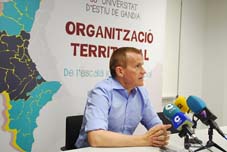
This last Friday, Laura Raga, vice-dean of the Faculty of Philosophy and Education Sciences, together with Vicent Horcas, professor from the Department of Teaching and Scholastic Organisation , have talked to the media about the subject matter of the course which they taught at Universitat d’Estiu de Gandia during 22 and 23 of this month. The course is titled “It is time to transform schools. Education for citizenship in a global society”.
Laura Raga, the organiser of the course, has affirmed that this course aims to “share and reflect” about how the students have to be taught the necessary social skills in the classroom and in the educational centre. The skills should link the educational centre with the society.
“When we prepared the syllabus for this course, we asked ourselves what knowledge was necessary to pass on with regard to specific strategies which are currently being developed in the educational centres, and we came up with Learning-Service”.
Learning-Service (APS) is an educational proposal which allows students to learn while they are doing community service, thus linking learning to a commitment to social service.
Professor Vicent Horcas has added that through these experiences, the students not only acquire cognitive skills but also those connected with attitudes and values. “It is an educational proposal with a very potent social utility”, he said.
“If we want our children to have skills which would let them develop as human beings in society, as well as at professional level, we have to focus the education with current changes in mind, and an education based on citizenship”, Horcas affirmed. It is an education where the individual is the protagonist of her own experience, based in the know-how, and a kind of education which teaches values such as solidarity, empathy etc.
APS has been implemented in Spain, with a network of 14 territorial associations, for ten years. Universitat de València, through Vice-Principal of Training Policies and Educational Quality, as well as Lifelong Learning and Educational Innovation Service “Manuel Sanchis Guarner” is implementing this learning and form part of APS, in which more than 40 Spanish universities participate.
Power and territory
Professor Joan Joan Carles Membrado, from the department of Geography from UV, has spoken in a press conference about the contents of the course offered at UEG about power and territory. Professor Membrado explained that the course encompasses the composition of the Spanish territory, analysing different regions, provinces and municipalities.
Currently, the national territory has 8.000 municipalities, out of which 640 form a part of Comunitat. The debate continues at the top level of this territorial composition. “The provincial councils are the organisms that question many collectives and political parties, oftentimes supporting the elimination of the same”, he explained.
Professor Membrado has insisted on the necessity of reflexion, with regard to the elimination of provincial councils, transfer of their functions, in other words “it´s important to see if the province or the community should be the one in charge of offering basic services to the municipalities” he pointed out.
Membrado has spoken about the new project aimed at the Valencian territory, whose aim is to create a commonwealth of municipalities. The idea is to use these regional structures to offer services to municipalities with a smaller population. “Another proposal is that of central regions, even though I don´t see them as a unity, but as three blocks headed by Gandia, Xàtiva and Alcoi”, he added.
The course takes advantage of the historical perspective and future development in order to understand better the current territorial composition, especially in the Valencian territory, given that, as Joan Carles Membrado has said, “While the old regions of Valencia have a historical background of eight centuries, dating back to the creation of the Christian Kingdom of Valencia by James I of Aragon, the provinces are a product of political transformation, an attempt at national modernization from the XIX century, following the French administrative model”.
Membrado will be the moderator of a round table which will close the 33rd edition of Universitat d’Estiu which focuses on the reflexion about Valencian regionalization and the possibility of reducing public duties and rationalizing the Administration.
Last update: 23 de july de 2016 08:04.
News release


















